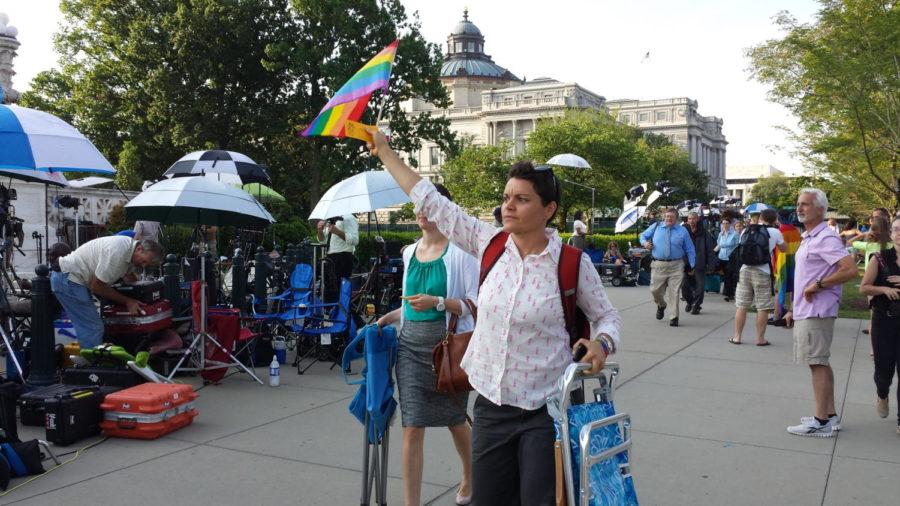“DOMA dead, love lives”
June 27, 2013
The Supreme Court of the United States gave its rulings on the 1996 DOMA (Defense of Marriage Act) and Proposition 8 cases early Wednesday morning.
The Supreme Court ruled in a 5-4 decision that DOMA was unconstitutional. The federal government will no longer treat individuals in legal gay and lesbian marriages differently from those in heterosexual marriages, and legal gay and lesbian marriages will be recognized in all states, no matter their marriage law.
“To find DOMA unconstitutional is to say that Congress cannot legislate what it attempted to legislate, Congress can no longer intervene to deny the benefits states guarantee gay and lesbian couples,” said Dirk Deam, senior lecturer of political science at Iowa State.
In another 5-4 vote, the Supreme Court ruled there was no standing on Prop 8, meaning same-sex marriage is legal in California.
Brad Freihoefer, director of LGBT services at Iowa State, described today as an “historic day, and a major step forward for Iowa State students.”
“This is a huge decision and it will be felt throughout the community,” Freihoefer said. “This is a huge deal and gives same-sex couples over 1,000 rights and responsibilities of marriage. The community is also delighted California will be joining once again.”
Currently, 12 states and the District of Columbia allow same-sex marriage.
While the Proposition 8 decision only impacts California, the DOMA ruling does affect the entire country. Deam said DOMA was passed by Congress and therefore applied to everybody.
Freihoefer described the student space in the student services building Wednesday morning before and after the DOMA and Proposition 8 rulings were announced.
“We had a pretty full student space of students and faculty waiting to hear what the Supreme Court decision was,” Freioefer said. “It was a really festive atmosphere and some really good conversations were happening. The students were thrilled to hear that same-sex marriages would be recognized all over the country.”
Before DOMA was overturned, people in same-sex marriages were suffering federal tax penalizations, and same-sex marriages were not recognized in states where it was not legal.
“The litigants in this case were in New York and enjoyed the benefits from the state, however DOMA interceded and created a tax penalty at the federal level. Whatever the states did, DOMA created this special restriction on any sort of benefits,” Deam said.
Deam clarified, while the Supreme Court ruled DOMA unconstitutional, there is no new fundamental human right.
“This is not an opinion that provides a sweeping change, the [Supreme] Court here could have announced a more encompassing opinion. It does not announce any new fundamental right; it does not identify any new constitutional rights.”
While the Supreme Court did not identify a new constitutional right, Deam said the opinion was still important because it stuck down DOMA. The Supreme court did not recognize gay marriage as a right, but if they had, Deam said that would have set precedence for the future.
Deam explained the term, suspect classification, and how that is relevant in the same-sex marriage discussion.
“Discrimination of gay people falls into the realm of suspect classification. We treat race as suspect classification because it has historically been discriminated against. We could do the same thing with sexual orientation status, but the Court did not do that,” Deam said.
However, Deam explained that sexual orientation has not been used as a suspect classification, but it is not completely out of the question.
“Sexual preference has never considered a suspect classification,” Deam said. “Justice Kennedy’s language in the DOMA case, and in earlier cases on homosexuality such as Lawrence v. Texas, sounds like he’s talking about a change in suspect classifications.“
Justice Anthony Kennedy wrote the Supreme Court’s opinion.
“DOMA divests married same-sex couples of the duties and responsibilities that are an essential part of married life and that they in most cases would be honored to accept were DOMA not in force … this [law] places same-sex couples in an unstable position of being in a second-tier marriage,” parts of the Supreme Court opinion read.
Deam thinks, as a political scientist, that the Supreme Court is going to eventually have to make a ruling on same-sex marriage.
“I don’t think they have any choice. Just like they did with segregation, somebody has to rule on something,” Deam said. “It is noticeable, its just not going to go away. Like what happened in Roe v. Wade in 1973, everybody knew an abortion decision was going to come down.”
David Pedersen, former President of the ISU College Republicans and junior in accounting at Iowa State, feels his generation is open to the idea of civil unions.
“I’m not opposed to civil unions or survivor benefits for same-sex couples,” Pedersen said.
“DOMA was about state’s rights over federally mandated rules, it was a federal overreach into state’s rights; this should have been more about states rather than Washington telling them what to do, which is a core principle of the Republican party.”

















